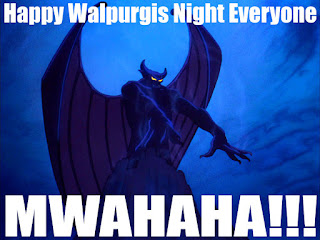Now that I have your attention with that rather provocative headline, I'd like to introduce you to something that ranks right up there with
carp in the bathtub and the
Easter pomlazka in terms of Czech traditions that might cause outsiders to scratch their heads. In Czechia, April 30th is known as
Pálení Čarodejnice; in Germany, where the celebration seems to have originated, it is called
Walpurgisnacht, or Walburga's Eve, after the saint whose feast day is May 1st. While the German name goes to the origin of the Christian tradition, the Czech one gets to the heart of the matter:
Čarodejnice just means "witches," and
Pálení "burning" so the night can safely be called "The Witch Burning"
 |
| Pictured: the witches, not yet on fire. |
See, St. Walburga was an English missionary in the 700s who came to Bavaria, along with a brother or two, and converted the local population to Christianity. So far, so standard for saints of this time period. However, the area she Christianized was also home to a mountain spot that was said to be where the witches' had their annual pow-wow. (Think
Fantasia "Night on Bald Mountain.") Through this connection, she became a patron saint for protection against witchcraft, and the night before her feast day--locally celebrated on May 1st, May Day--became celebrated as a night of purification and of warding off evil, especially witches.
As anyone who has seen the classic (though overrated)
Doctor Who story "
The Daemons" knows, there is a tradition of magical or mystical forces being connected with April 30th/May 1st (Beltane being the Anglicized word) that stretches into the British Isles. It's certainly possible to conclude, therefore, that the Czech
Pálení Čarodejnice, German
Walpurgisnacht, and Celtic Beltane all pre-date Christianity, the same way modern Halloween (exactly 6 months later on the calendar) traces its origins back to pagan festivals, and that this time of year has been marked with festivals for thousands of years. I certainly conclude as much, but I am not a comparative anthropologist, so what do I know?
 |
| But I do know parties and this is a banger. Witches know how to cut loose. |
Regardless of its origins,
Pálení Čarodejnice is still fairly widely celebrated in many parts of Czechia, where the main symbolism of the witch seems to be connected to the death of winter and the triumph of spring, which makes the May Day connection even stronger. And yes, we'll get to May Day in the next post, because that's totally a thing here, too.
 |
| Sneak preview. |
So, how do Czechs celebrate Witches' Night? Well, much like Bonfire Night in the UK, the main centerpiece is a bonfire...and the burning of an effigy.
 |
| AAAAAAHHHHHHHHH!!!!!!! |
There are many variations of
Čarodejnice, as the night is sometimes known for short--as is to be expected from something that stems from folklore and has little commercial or official component--but what seems to be consistent is this: children gather old clothes and rags and stuff them with straw or other materials, to create a vaguely human shape, often topped with a traditional pointy hat and a drawn face; meanwhile, the older boys/young men of the village gather the wood and build the bonfire; the effigy is placed atop the pyre, often after being paraded through town...
 |
| The Fire Department often handles the fire part these days. Which seems safer than just asking Pavel and his friends. |
...then the whole thing is set ablaze. As the effigy burns, the town gathers around the fire to talk, drink, eat fire roasted sausages, and generally have a bit of a party.
 |
| Definitely a bit of Wicker Man vibe... |
Also, let's not dwell too deeply on the idea of cooking and eating sausages over an open fire that also features a burning human effigy. Even if you cook the sausages over a smaller fire, as is often the case, that's some potent symbolism right there.
 |
| Delicious potent symbolism. |
The night is made even more festive by witch costumes, music, and general merriment. It's like a cross between Bonfire Night, Halloween, and the 4th of July, and the fact that the next day is a state holiday--May Day--means that no-one has to worry about getting to bed early. Even here in Prague, various large parks host witch burnings, and the night has a general "family fun" atmosphere. Unfortunately, I will be at the theater on the night of the 30th, but I hope to be able to see some embers after the final curtain comes down.
Enjoying the blog? Want to hear the podcast, see the videos, and generally be a very nice person? Consider supporting my Patreon!
Become a Patron!










Comments
Post a Comment